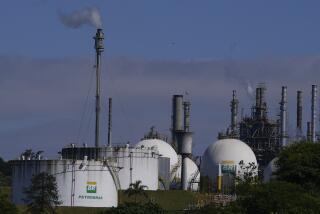OPEC Member Agrees to Cut Oil Production : Pledge by Emirates Boosts Cartel’s Hopes
- Share via
GENEVA — A large OPEC producer pledged Tuesday to cut its oil production by 25%, giving a modest lift to the cartel’s hopes of agreeing on a credible plan for driving oil prices higher.
The United Arab Emirates, among the biggest producers in the Organization of Petroleum Exporting Countries, said the production cut would bring it into line with the two-month OPEC accord on production controls that is due to expire Oct. 31.
No policy decisions were made on the second day of OPEC’s deliberations in a Geneva hotel, and officials said the talks could last several more days.
United Arab Emirates Oil Minister Mana Saeed Oteiba told reporters that his country was cutting its production to 950,000 42-gallon barrels a day from between 1.2 million and 1.3 million barrels daily.
The new figure is the quota that it was assigned under a temporary agreement in August but had ignored.
The Persian Gulf nation’s violation of the accord, acknowledged publicly for the first time Tuesday, was a major hindrance to OPEC negotiations on what to do about production when the current agreement expires. Three other unidentified members also were reported to have exceeded their quotas, but by relatively small amounts, compared to the violation by the United Arab Emirates.
OPEC wants to continue restricting its output as a means of driving oil prices up to $18 or $19 a barrel by the end of the year, OPEC President Rilwanu Lukman of Nigeria told reporters.
The cartel’s main problem lies in finding a way to divvy up an overall production ceiling among its 13 members.
Prices for oil were ranging between $7 and $12 a barrel in late July, when the OPEC ministers last met. It was their fourth effort this year to reach a production limitation agreement.
Then, in early August, they announced that with the exception of Iraq, all members would return to their 1984 quotas. Including 2 million barrels daily from Iraq, OPEC’s targeted aggregate production dropped to 16.8 million barrels a day from an estimated 20 million to 20.5 million barrels daily.
Brent Crude Price Rises
Prices rose accordingly and have hovered at levels ranging between $14 and $16 a barrel.
After Oteiba announced the United Arab Emirates’ cutback pledge Tuesday, the price for October delivery of Brent crude, the major North Sea variety, rose by 50 cents to $14.50 a barrel in London.
On the New York Mercantile Exchange, West Texas Intermediate, the benchmark U.S. crude, closed at $15.40 a barrel, up 58 cents from Monday’s final price.
Stephen Turner, an oil analyst at the investment firm of Wood, Mackenzie & Co. in Edinburgh, Scotland, said the day’s price increases were due partly to the United Arab Emirates’ announcement.
“That can’t but help” OPEC’s efforts to convince the oil industry that it can muster the discipline to honor its promises on production, he said.
Also helping to boost prices, Turner said, were reports from the Persian Gulf that Iran’s oil-export facilities at Kharg Island had sustained new damage in air raids by fellow OPEC member Iraq.
Reallocation of Quotas
The oil ministers decided on the second day of their closed-door conference to split into two committees for a detailed discussion of production quotas and a review of oil pricing policy, Lukman told reporters.
Conference sources, speaking on condition that they not be identified, said this decision was prompted by calls from Saudi Arabia and Kuwait for a reallocation of production quotas to give them bigger shares.
Lukman said the full ministerial conference would not resume until the committees had prepared recommendations on quotas and pricing. He said that probably would be done by tonight or Thursday morning.
Lukman said that if OPEC fails to reach a new, permanent set of production quotas that would drive prices up to $18 or $19 a barrel, it might be forced to simply extend for another two months the August agreement.
OPEC could try again to agree on a more lasting system at its regularly scheduled December meeting.
“You can be sure that whatever we do will not cause a disruption in the market,” Lukman said.
More to Read
Sign up for Essential California
The most important California stories and recommendations in your inbox every morning.
You may occasionally receive promotional content from the Los Angeles Times.












